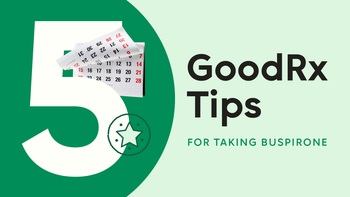
How Does Buspirone Work? All About Its Mechanism of Action
Key takeaways:
How buspirone works isn’t fully understood. But it’s thought to work by managing serotonin levels in the brain. Low serotonin levels have been linked to anxiety.
Buspirone can take up to a month to work. So it isn’t a good option for quick relief of anxiety.
Buspirone isn’t usually a first-choice medication for anxiety-related conditions. Other medications, like selective serotonin reuptake inhibitors (SSRIs) and serotonin and norepinephrine reuptake inhibitors (SNRIs), are typically tried first.
Access savings on related medications
Table of contents

If you live with an anxiety-related condition, you’re not alone. Close to one-third of U.S. adults experience an anxiety disorder at some point in their lives. Luckily, anxiety disorders are treatable. Treatment looks different for everyone, but it may include going to therapy, attending support groups, and taking medications.
While not everyone will need medication for their anxiety, it’s good to know there are many options. Buspirone is just one medication option for treating generalized anxiety disorder. But how does it work and how is it different from other anti-anxiety medications?
How does buspirone work?
Experts don’t fully understand how buspirone works to treat anxiety. But the leading hypothesis is that buspirone may help manage serotonin activity. It's thought to attach to serotonin receptors (binding sites) in the brain. Serotonin is a chemical that’s involved in managing your mood. Low serotonin levels have been linked to anxiety.
Search and compare options
But buspirone usually isn’t a first-choice treatment option for anxiety. Other types of medications, like selective serotonin reuptake inhibitors (SSRIs) and serotonin and norepinephrine reuptake inhibitors (SNRIs) are usually tried first. Examples of SSRIs include escitalopram (Lexapro) and paroxetine (Paxil). Examples of SNRIs include duloxetine (Cymbalta) and venlafaxine.
SSRIs and SNRIs are commonly prescribed antidepressants, but they’re good at treating anxiety, too. If an SSRI or SNRI doesn’t work on its own, adding buspirone may help.
Does buspirone kick in immediately?
No, buspirone does not kick in immediately. It can take 2 to 4 weeks for it to start working. This means you may not feel the anti-anxiety effects of buspirone for a while. This is similar to how quickly SSRIs and SRNIs work, as well.
Is buspirone good for short-term anxiety?
No, since buspirone takes a few weeks to kick in, it may not be the best option if you need immediate relief. If your anxiety is significantly impacting your daily life, you and your healthcare provider may decide you need something that works faster.
Short-term, fast-acting anxiety medications can be taken alone. But they’re more often taken alongside long-term anxiety medications like SSRIs, SNRIs, or buspirone. Fast-acting anxiety medications are not meant to be taken long term in most cases.
Examples of fast-acting anxiety medications include benzodiazepines like alprazolam (Xanax) and diazepam (Valium). These medications can be useful at treating anxiety in certain situations, like panic attacks. But they can make you drowsy and have serious potential side effects, including physical dependence and misuse.
Hydroxyzine (Vistaril) is another fast-acting anxiety medication. It’s not habit-forming like benzodiazepines, but it can cause significant drowsiness.
What does buspirone feel like when it works?
When buspirone starts to work, you should start to feel your anxiety symptoms improve. These symptoms might include feelings of:
Worry
Irritability
Restlessness
Dread
Fear
When these emotional symptoms of anxiety improve, your physical symptoms may improve, too. The physical symptoms of anxiety can include an upset stomach, fast heart rate, and trouble sleeping.
How is buspirone different from other anti-anxiety medications?
There are a few things that differentiate buspirone from other anxiety medications. This includes:
Buspirone works differently. We’ve described how buspirone is thought to work. It’s the only anxiety medication that works this way. While SSRIs and SNRIs also affect serotonin, they do so in different ways.
It may not be as effective as other anxiety medications. This is especially true for some specific anxiety disorders, such as panic disorder and social anxiety disorder.
Buspirone doesn’t make most people tired. Some anxiety medications, like benzodiazepines, hydroxyzine, and some SSRIs and SNRIs can make you feel tired. Buspirone isn’t known to cause drowsiness for most people.
It isn’t habit-forming. Unlike benzodiazepines, buspirone isn’t known to cause dependence or misuse.
It’s usually taken twice a day. Some SSRIs and SNRIs only need to be taken once a day.
The bottom line
Buspirone’s mechanism of action isn’t fully understood. But the medication may work by balancing serotonin levels in the brain. Low serotonin levels have been linked to anxiety.
Buspirone isn’t usually a first-choice medication for anxiety-related conditions. Other medications, like selective serotonin reuptake inhibitors (SSRIs) and serotonin and norepinephrine reuptake inhibitors (SNRIs), are typically tried first.
For short-term, quick relief of anxiety symptoms like panic attacks, benzodiazepines or hydroxyzine (Vistaril) are usually better options than buspirone. This is because buspirone can take up to a month to work. But buspirone may be safer for long-term use than some other options, since it isn’t habit-forming.
Why trust our experts?


References
Anxiety and Depression Association of America. (2015). Clinical practice review for GAD.
Blanco, C., et al. (2014). Psychopharmacology for social anxiety disorder. Social Anxiety.
National Alliance on Mental Illness. (2015). Anxiety disorders.
National Institute of Mental Health. (n.d.). Any anxiety disorder.
PD-Rx Pharmaceuticals, Inc. (2023). Busprione hydrochloride - buspirone hydrochloride tablet [package insert].
Seksel, K. (2008). Behavior-modifying drugs. Small Animal Clinical Pharmacology.
Was this page helpful?
Related Articles
Browse medications
View AllResearch prescriptions and over-the-counter medications from A to Z, compare drug prices, and start saving.




















